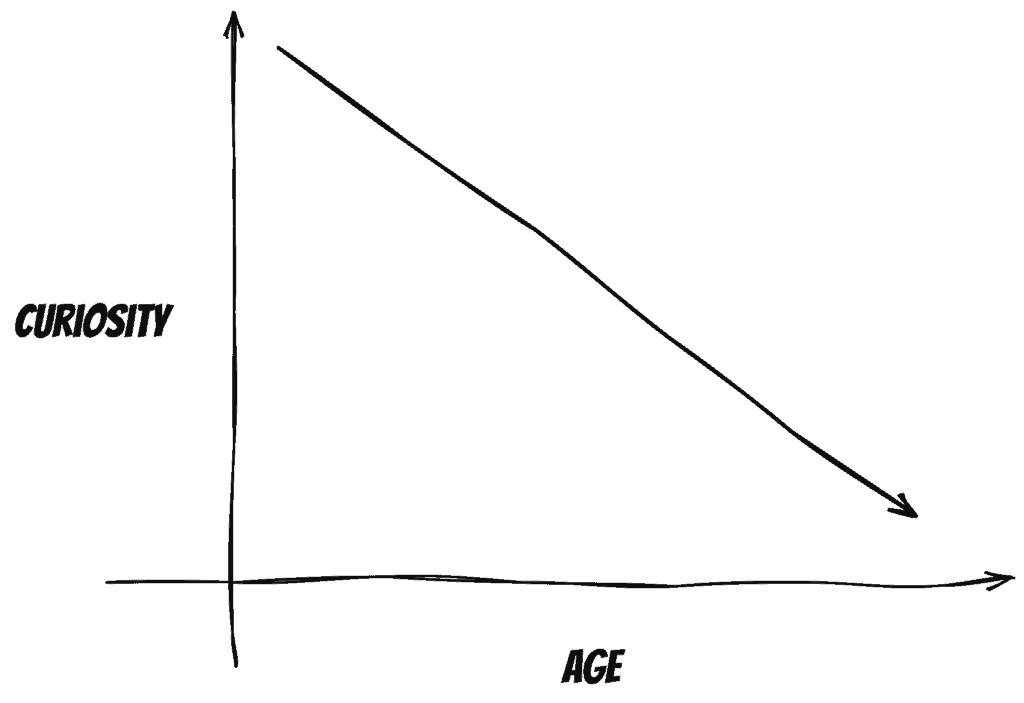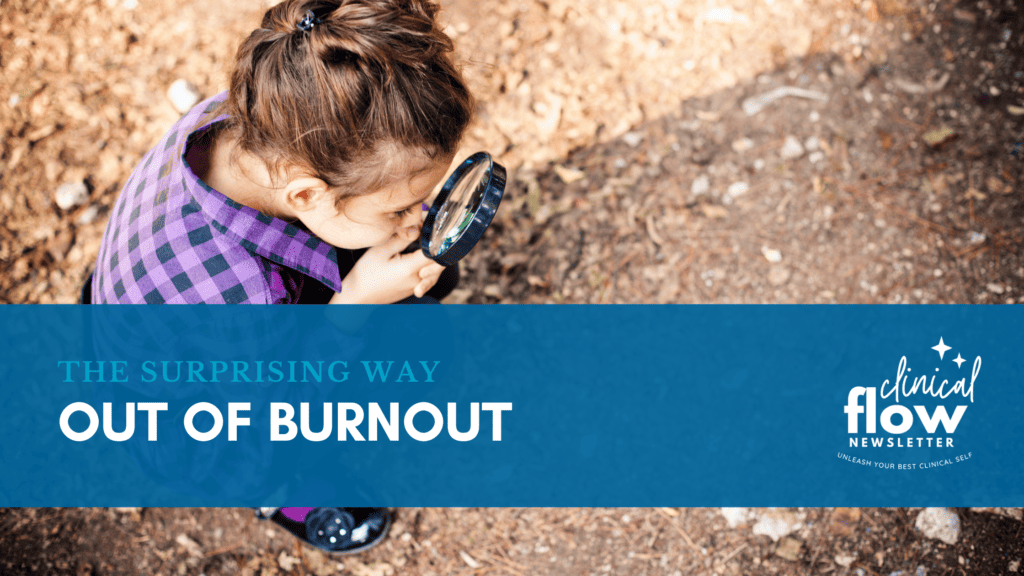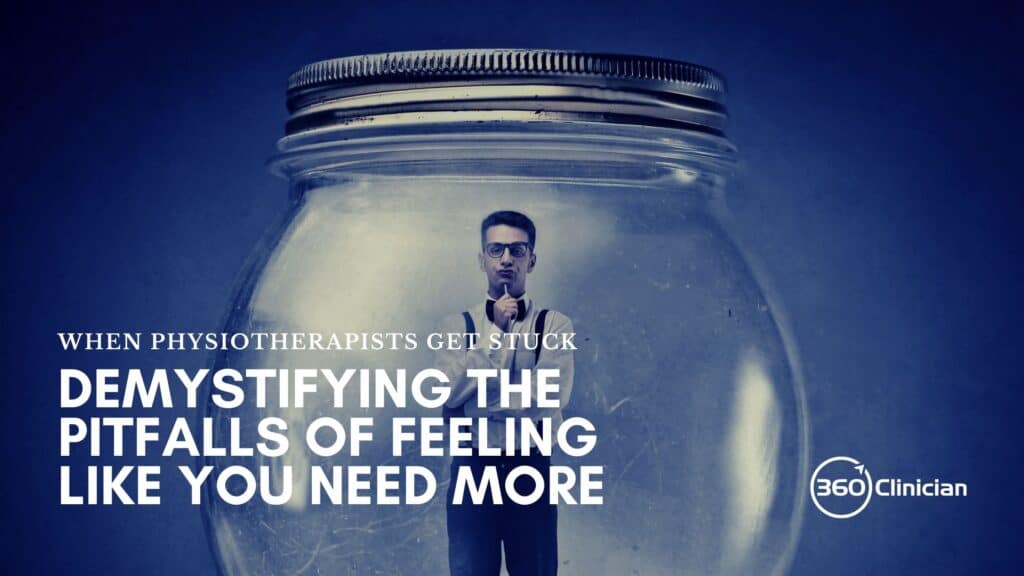Clinical work can be draining and we can easily find ourselves feeling exhausted, going through the motions and experiencing burnout.
One day bleeds into the next and little excites us in our day.
We can find ourselves waking up with anxiety about getting through our day and then find ourselves worn out at the end of the day only to start the process all over again the next day.
Emotional exhaustion sets in.
And before we know it, we’re questioning what we’re doing in this profession. We can become detached in our interactions with patients and feel like we have nothing left to give.
The way out can feel murky.
When you’re feeling this way, it can be hard to know how to get out of this rut. We quickly realize that a holiday only invigorates temporarily, but it doesn’t solve our dilemma.
We find ourselves questioning our choice of profession and start contemplating an exit.
I was burnt out four years after practicing as a physiotherapist.
I was discouraged, drained and frustrated with where I found myself. I had gone through a significant amount of personal turmoil making the career transition to become a physiotherapist.
I felt like I had made a major mistake.
I explored the idea of becoming a teacher, but a morning of job shadowing made me realize this was not the answer.
I didn’t want to start over again, but I didn’t know how to get myself into a healthier place where I enjoyed my work. I knew that I needed to find a better way. I began exploring ways to gain better career alignment and searched for ways to better manage myself and my energy so I could enjoy my work again.
A new path forward.
While there are many elements necessary to move out of a place of exhaustion, I believe there is one factor that stands head and shoulders above all others. It doesn’t require a change in work environment or patient population.
The antidote is fostering curiosity.
Merriam-Webster defines curiosity as a “desire to know” or an “interest leading to inquiry”.
Curiosity is a trait that permeates all of life and isn’t relegated to only one or two aspects of life. It’s friendly and non-intrusive. It’s bi-directional – meaning that curiosity is directed outwards to people and things, but also directed inward through introspection and reflection. And most importantly curiosity isn’t a passive experience. It moves us towards thought and action. (Schattner, 2015)
Curiosity is a powerful trait that not only is a sign of healthy work engagement, but I believe an important way to overcome burnout and stagnation.
Each of us is gifted with curiosity which thrives during childhood. Unfortunately, curiosity can often decline as we get older. We engage in less play as we get older and we can get comfortable with what we know and do.

I believe that curiosity is often one of the first traits that is dampened on the road to emotional exhaustion. Increased work pressures and stress can often result in curiosity being displaced for efficiency. We become less flexible in our ability to adapt. Rigidity is considered the personality factor most closely associated with burnout (Epstein).
We begin to adopt beliefs about curiosity during the early burnout process such as:
- I don’t have time to dig deeper right now. I just need to get through this session.
- It’s too exhausting to be curious right now.
- I don’t care why this is causing this clinical presentation.
- What’s the point of digging deeper?
- What if I look stupid in front of the patient?
When we become emotionally exhausted in our work, we look to preserve our inner self (see psychological immune system), reduce cognitive load and minimize challenge so as to conserve energy.
How curiosity can reinvigorate your work
When I find myself struggling with early signs of burnout, I have found that focusing on fostering curiosity has been an important way to begin the reset process to more energy and engagement in my work.
Being curious is intrinsically a place of openness – an openness to one’s experience, to another person and to one’s self. Fostering curiosity moves us away from rigidity.
When I’ve been emotionally exhausted I find myself detached and checked out. Curiosity moves us out of passivity towards action. It signals a shift in how we interact with the world and within ourselves.
A clinical setback doesn’t end up causing more emotional exhaustion, but instead is an opportunity to explore and inquire. We struggle less because we’re not trying to control the outcome. We begin to move away from rigidity to a place of flexible openness.
Additionally, being curious leads to improved meaning and satisfaction. In a study examining the role of curiosity on life satisfaction and meaning, the authors found that study participants who were more curious, engaged in more growth-oriented activities and experienced greater meaning and life satisfaction (Kashdan et al, 2007).
And the ability to imbue more meaning into one’s day tackles another of burnout’s key characteristics – the sense of decreased personal achievement. When we’re curious, we experience more meaning because we’ve changed the way we’re interacting with the world. That shift will change our sense of accomplishment and elevate our achievements.
The beauty of focusing on curiosity is that it doesn’t require a change in one’s work environment. It’s something that can be added immediately. Curiosity can be applied in our personal life or work life and the benefits will be felt across all aspects of life. And finally, curiosity can start small and build as one’s energy and outlook improve.


